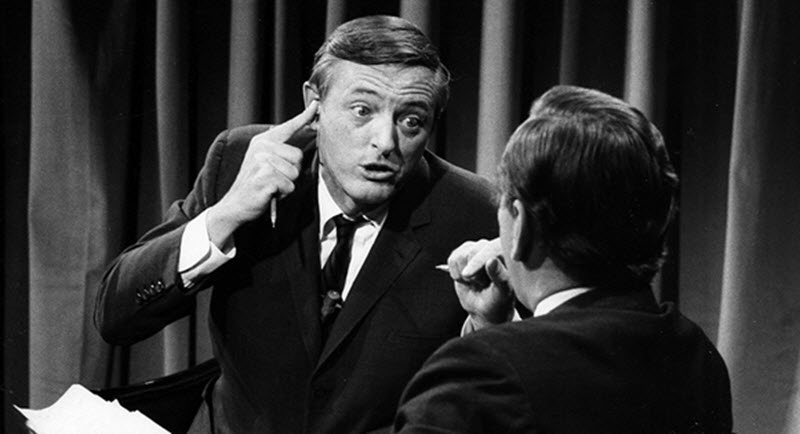Best of Enemies
 for some sexual content/nudity and language.
for some sexual content/nudity and language.
Reviewed by: Jim O'Neill
CONTRIBUTOR
| Moral Rating: | Offensive |
| Moviemaking Quality: |
|
| Primary Audience: | Adults |
| Genre: | History Documentary |
| Length: | 1 hr. 27 min. |
| Year of Release: | 2015 |
| USA Release: |
January 23, 2015 (festival) July 31, 2015 (limited) DVD: November 3, 2015 |
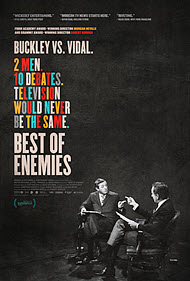


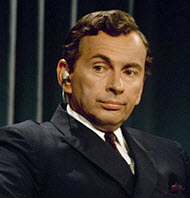
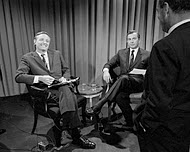
Buckley Online—a complete guide to the writings William F. Buckley at Hillsdale College
After Buckley’s death on February 27, 2008, Gore Vidal got the last word by publicly disparaging Buckley and writing, “RIP WFB—in Hell.”
Vidal quote: “I’m exactly as I appear. There is no warm, lovable person inside. Beneath my cold exterior, once you break the ice, you find cold water.” (Charles McGrath’s 2012 eulogy for Gore Vidal, New York Times). McGrath also noted, “By the time he was 25, he had already had more than 1,000 sexual encounters with both men and women, he boasted in his memoir Palimpsest. Mr. Vidal tended toward what he called ‘same-sex sex,’ but frequently declared that human beings were inherently bisexual…”
lust and fornication in the Bible
sin and the fall of man
What part should morality play in politics? Answer
Does character matter in political leaders? Answer
Voting—Do Christians have an obligation to vote? Answer
How can we know there’s a God? Answer
What if the cosmos is all that there is? Answer
If God made everything, who made God? Answer
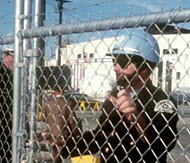
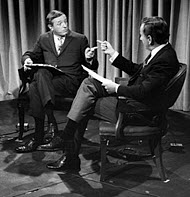
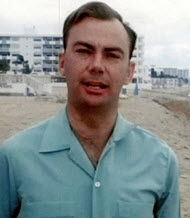
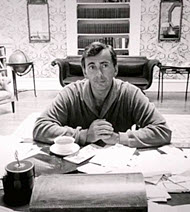
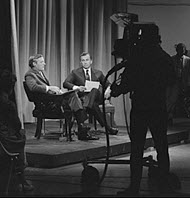
| Featuring |
|---|
|
William F. Buckley Jr. … Himself (archive footage) Gore Vidal … Himself Kelsey Grammer … Himself (reading Buckley’s words) John Lithgow … Himself (reading Vidal’s words) Dick Cavett … Himself Noam Chomsky … Himself Christopher Hitchens … Himself Matt Tyrnauer … Himself Ginia Bellafante … Herself Brooke Gladstone … Herself Sam Tanenhaus … Himself |
| Director |
|
Robert Gordon Morgan Neville |
| Producer |
|
Tremolo Production Media Ranch |
| Distributor |
|
Magnolia Pictures Participant Media |
Robert Gordon and Morgan Neville’s “The Best of Enemies” is a superlative documentary. It renders an American time and place with enough perspicacity to make us see ourselves in a new light. Its subject is as timely today as it was almost 50 years ago when the events in the film take place.
In 1968, ABC was in third place in the television news ratings. One expert comments: “They would have be in fourth place, but there were only three networks.” Walter Cronkite hosted the CBS News, Huntley and Brinkley helmed NBC, and Howard K. Smith brought up the rear at ABC. The losing network wanted to enhance its coverage of the fateful 1968 Republican and Democratic conventions by hosting a series of debates between conservative author and commentator, William F. Buckley, Jr. and playwright, novelist and provocateur Gore Vidal. What resulted was less a debate about the political winds of the day than a clash of two cultures, a war that still rages today.
I watched those debates and those conventions when I was a young teenager (80% of the television viewing public tuned into the coverage that year). I was fascinated and shocked. The protests, the riots and the clashes between young people and police had an “end-of-days” quality that unsettled everyone who watched the coverage. The living room was no longer a safe retreat from the harsh realities of the outside world. As a counterpoint to the chaos, it was a pleasant diversion to watch two renowned intellects and masters of language go head to head, at least until the two well-dressed and well-heeled gentlemen created their own chaos.
Both Vidal and Buckley are competent jousters who knock each other off their high horses repeatedly. The bon mots fly back and forth, the eyes glower, and the teeth bare. It is combat of the rawest form, and it’s a delight to watch it, even, or perhaps especially, after the passage of almost a half a century. The debate’s climax comes when Vidal fires a sharp barb at Buckley. He calls him a crypto-Nazi. To that Buckley responds: “Listen you queer, I’ll sock you in the g**d*** face, and you’ll stay plastered forever.” Whoah! The crypto-Nazi remark is a harsh one, but it has its intended effect. Buckley is caught off-guard and off-balance. His retort is something that he will regret for the rest of his life. Score one, a big one, for Vidal.
The Buckley-Vidal debates are a lot more invigorating and full of surprises than today’s television pundit exchanges, most of which are a combination of rehearsed talking points, feigned indignation and spittled puffery. We rarely experience suspense and surprise on a debate stage today. Taking us back to the Buckley-Vidal contests lets us in on what we’ve been missing for so long.
But it is not just those debates that feel spontaneous and energized. The news itself also had an air of the unexpected, a sense that something might happen at any moment that could astonish us. And it did. The walls of the convention hall tumble, sound systems break down, and Sam Donaldson goofs his intro lines. Yet, in the midst of it all, there’s a “let’s just go with it” drive that puts substance above style. Even the celebrities who pop up intermittently do so without a script and without a bevy of handlers. Paul Newman and Arthur Miller don’t seem to mind looking unrehearsed and befuddled, as they wander amidst the tawdriness that keeps rearing its head at the Democratic convention in Chicago. Aretha Franklin flubs the words to the National Anthem at the opening of same convention, but she smiles and goes gamely on. Can you imagine one of today’s recording artists putting themselves in a similar uncontrolled situation? No wonder Beyoncé chose to lip-synch her music at the last Inauguration ceremony.
Buckley was a devoted conservative and a devout Christian. He believed that the ethics of God and country were under threat in the 1960s, and he fought to communicate and encourage those values in politics, and especially in the culture. Gore Vidal believed that the country should eschew its priggish past and forge a new beginning. America needed to look critically at itself: “we are all prostitutes in one sense or another, ethically if not sexually.” It was Vidal’s views on sexuality that particularly bothered Buckley. He referred to Vidal’s novel Myra Breckinridge, the story of a man who becomes a woman who becomes a man and then rapes a man, not as literature but as pornography. That had to have stung Vidal, who considered himself unequaled among American authors. And for a time he was. Yet, today, his books are rarely mentioned and hardly ever read.
The film also explores the lives of its two antagonists after the 1968 debates. Buckley continued to write and to edit National Review magazine. His PBS show “Firing Line” was broadcast weekly on PBS. Vidal made public appearances (“there are two things one should never turn down: sex and being on television”), and wrote a collection of successful historical novels (Burr, Lincoln, 1876, Washington D.C.), but he retreated to a cliffside mansion in Ravello, Italy for the remainder of his life (“What better place to watch the downfall of Western civilization?”). The filmmakers are a bit cruel here. They portray Vidal as a modern day Norma Desmond, the silent screen legend of Billy Wilder’s “Sunset Boulevard,” who holes up in a mansion rejecting the present and living out the past as she sinks into madness. They show scenes of that film, as well as some scenes from the film adaptation of Myra Breckenridge and from “Caligula” whose screenplay Vidal wrote. Those movies, two of the worst films ever made, do nothing to boost Vidal’s flagging reputation.
The debates took place at a time when people had confidence in TV news. “We watched it together as a nation,” Tod Gitlin says in one of the segments. That may be true, but there was no place else to go, even if we wanted to. There was no cable TV and no Internet.” On the upside, the lack of competition allowed television to take risks. Today, news programs are packaged and framed. We know what will unfold even before we push the “on” button. Perhaps that explains the success of “Dancing with the Stars” and “American Idol.” When we watch those shows, we feel as though we have a stake in what happens, and the end result may actually surprise us. We may watch those shows “together as a nation,” but we sure don’t watch the news that way.
Instead, we retreat to our own favored cable channels and Internet blogging sites. We are divided now in a way we were not in 1968. In “Best of Enemies,” there are some delightful scenes of William F. Buckley Jr. appearing on Woody Allen’s television show and on “Rowan and Martin’s Laugh-In” which was the number one program on TV for several years in the 60s. Those comedy shows were satirical and funny, but they were also respectful of their guests, no matter the guest’s political point of view. Can you imagine the same good will, or self-deprecating humor (the best, and most lasting, kind) on the “Colbert Report” or Jon Stewart’s show? Or on talk radio?
I went to see “Best of Enemies” out of a sense of nostalgia for a time I had grown up in and had mostly forgotten. I believe Vidal and Buckley would have disdained such a motive. Nostalgia implies remembering something with sentiment, and seeing it through a rose-colored lens. Buckley and Vidal would would shun such “feeling.” They encouraged us to open our eyes and see things for what they truly are. Buckley would suggest we look for God in the world around us, and listen to His voice. Vidal would have us listen to our own voice, to our own inner god. We have been given the freedom to choose between those two philosophies. The choice defines not only our own future, but humanity’s future, as well. That battle was waged valiantly in 1968 between Buckley and Vidal, and is displayed majestically today in this sublime documentary.
Violence: Moderate / Profanity: Moderate / Sex/Nudity: Heavy
See list of Relevant Issues—questions-and-answers.


PLEASE share your observations and insights to be posted here.
